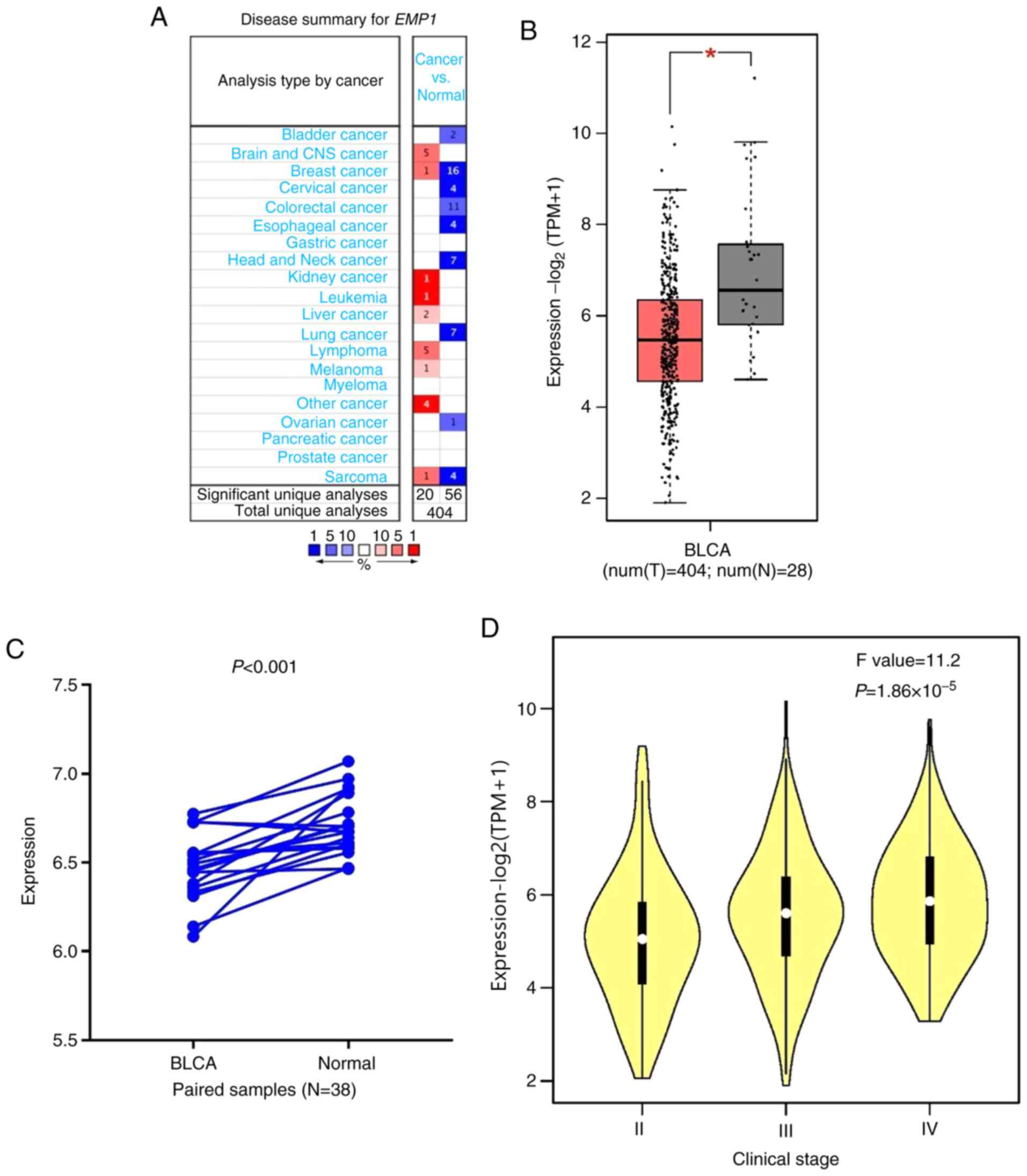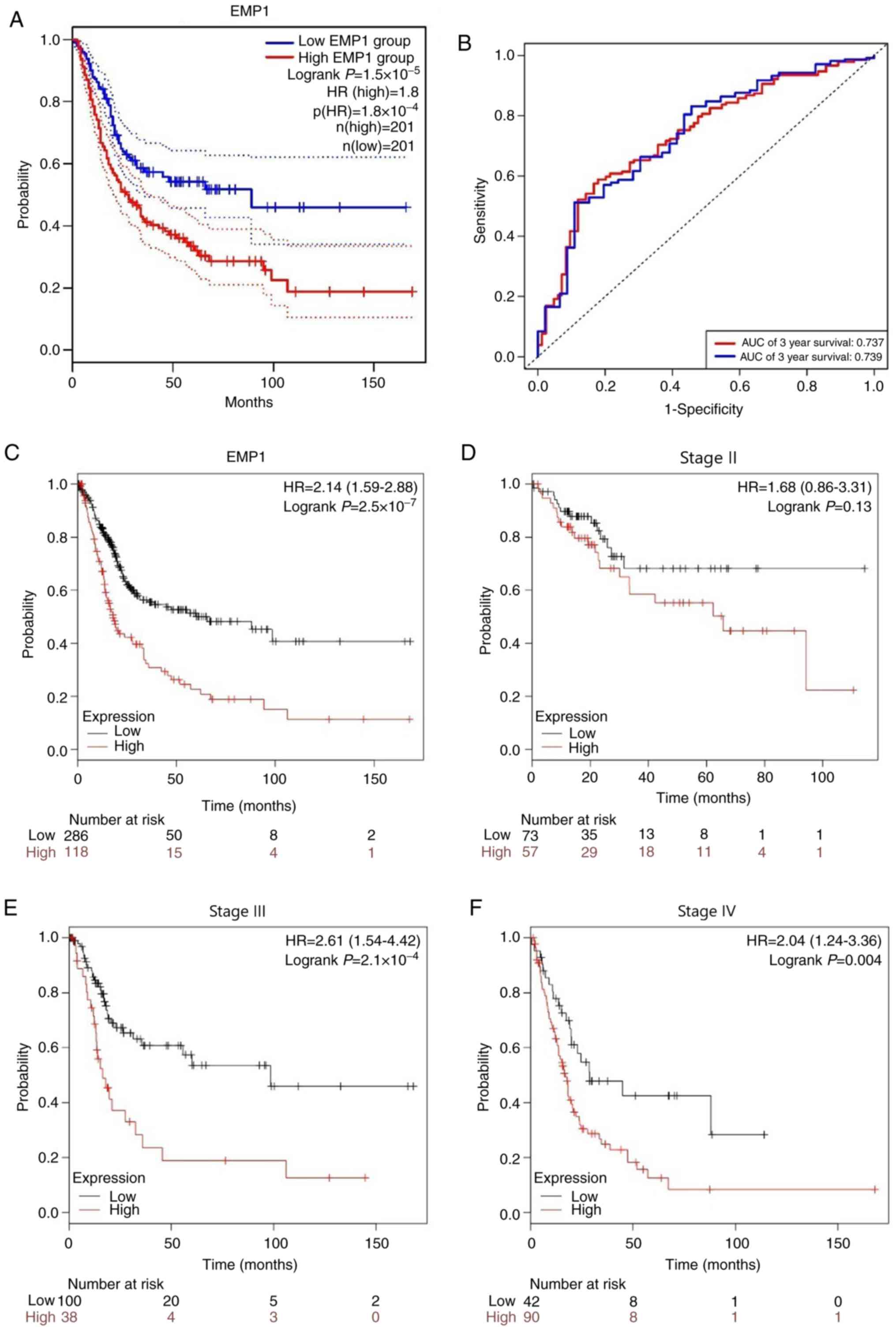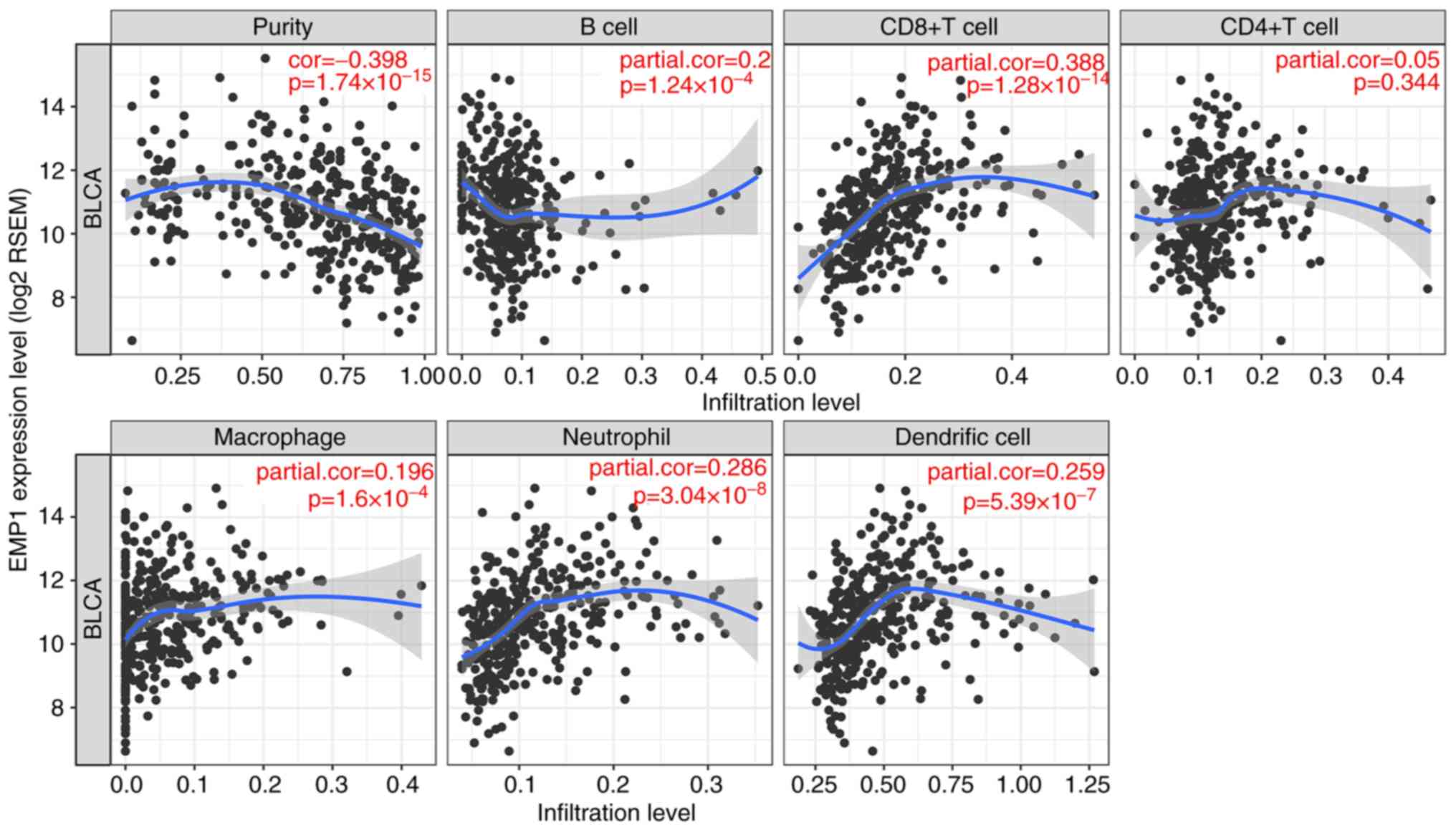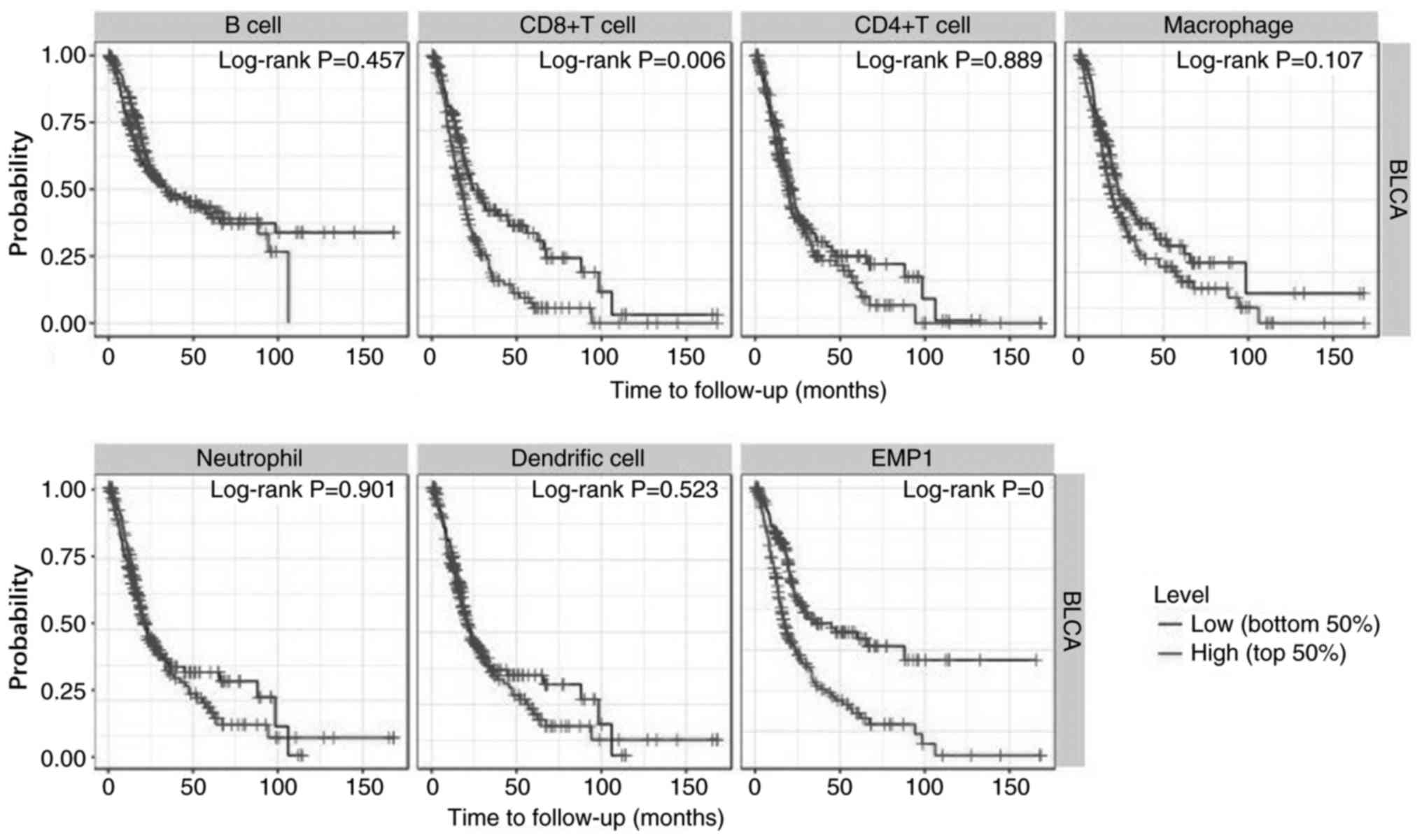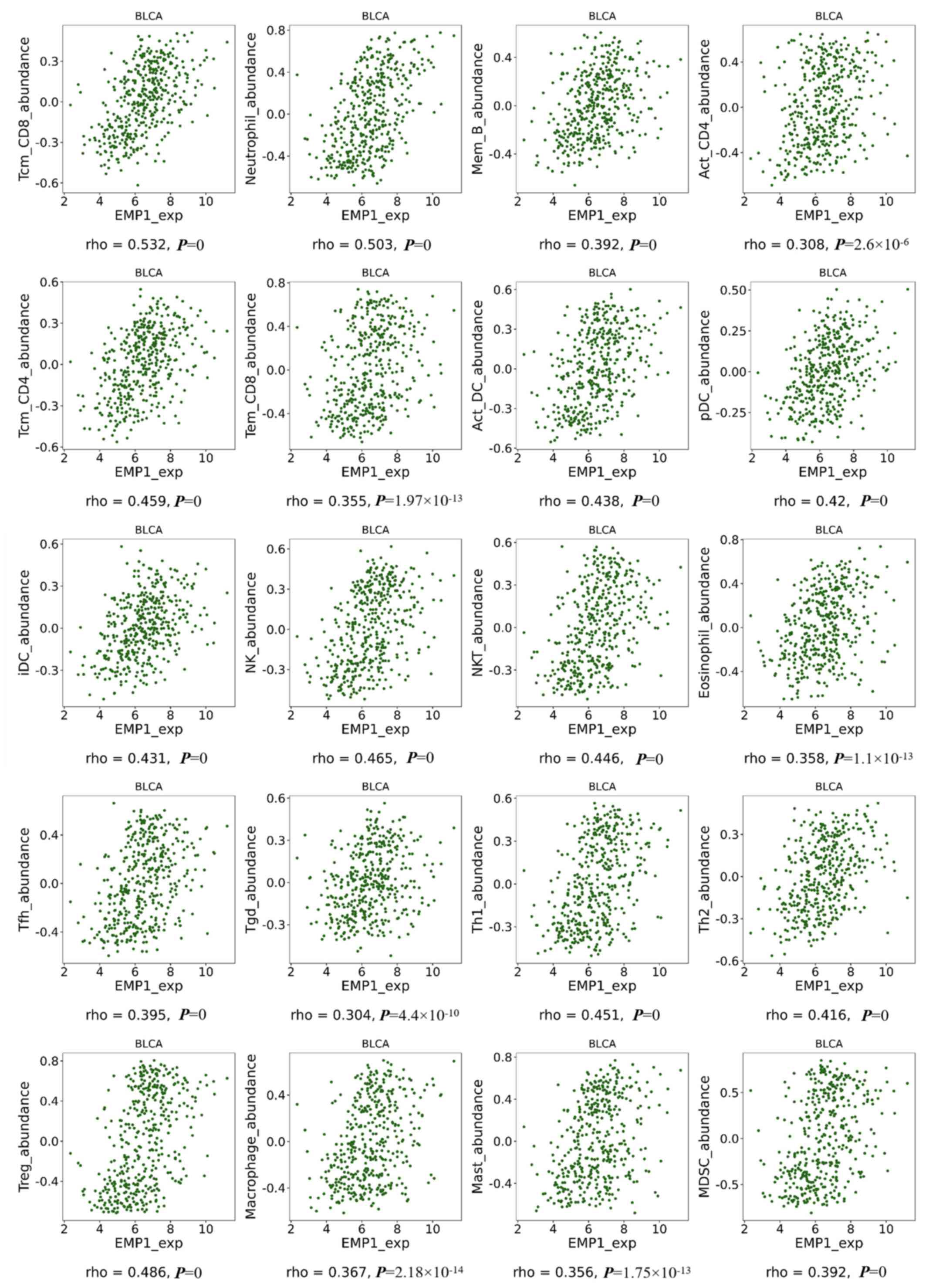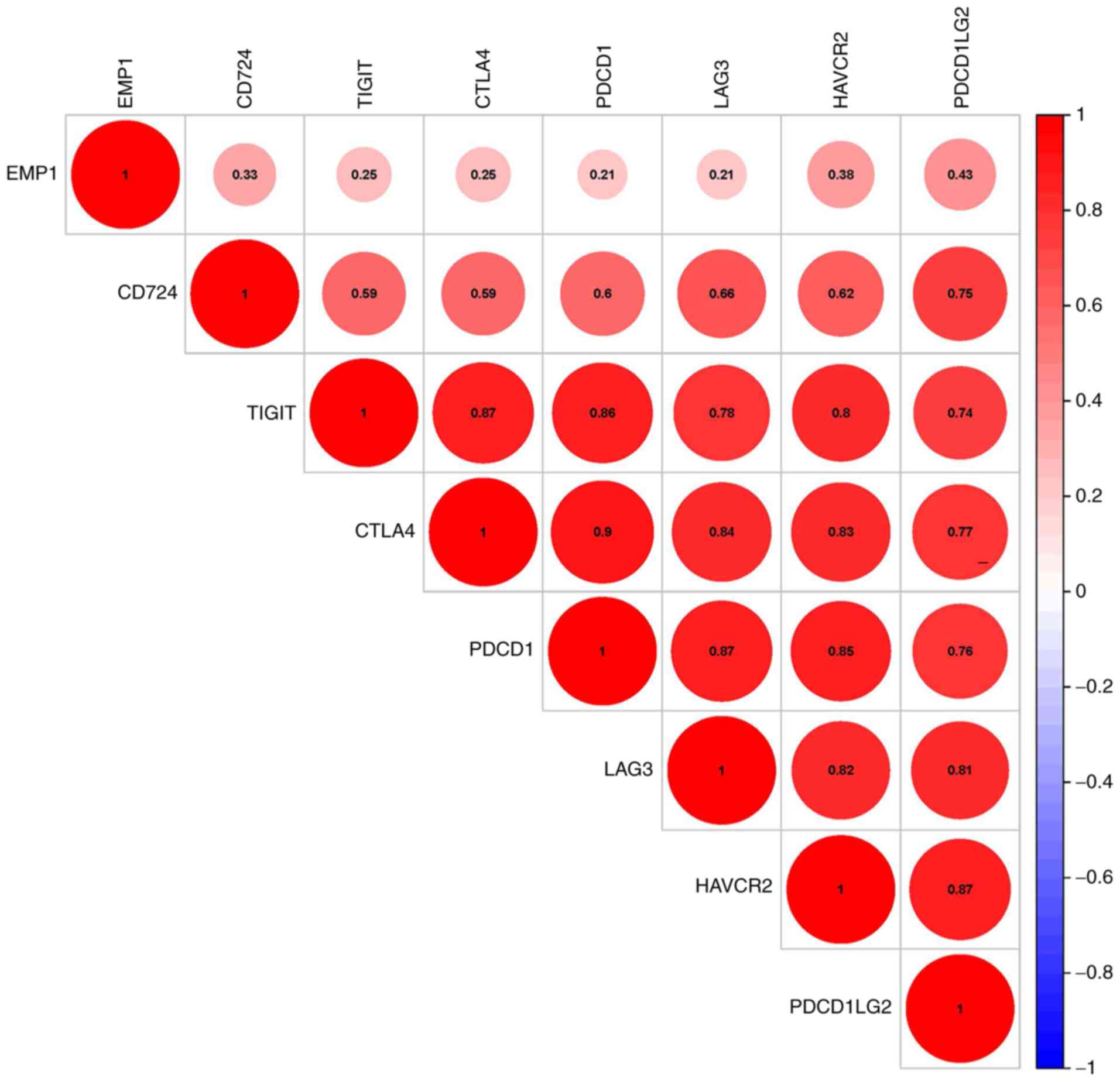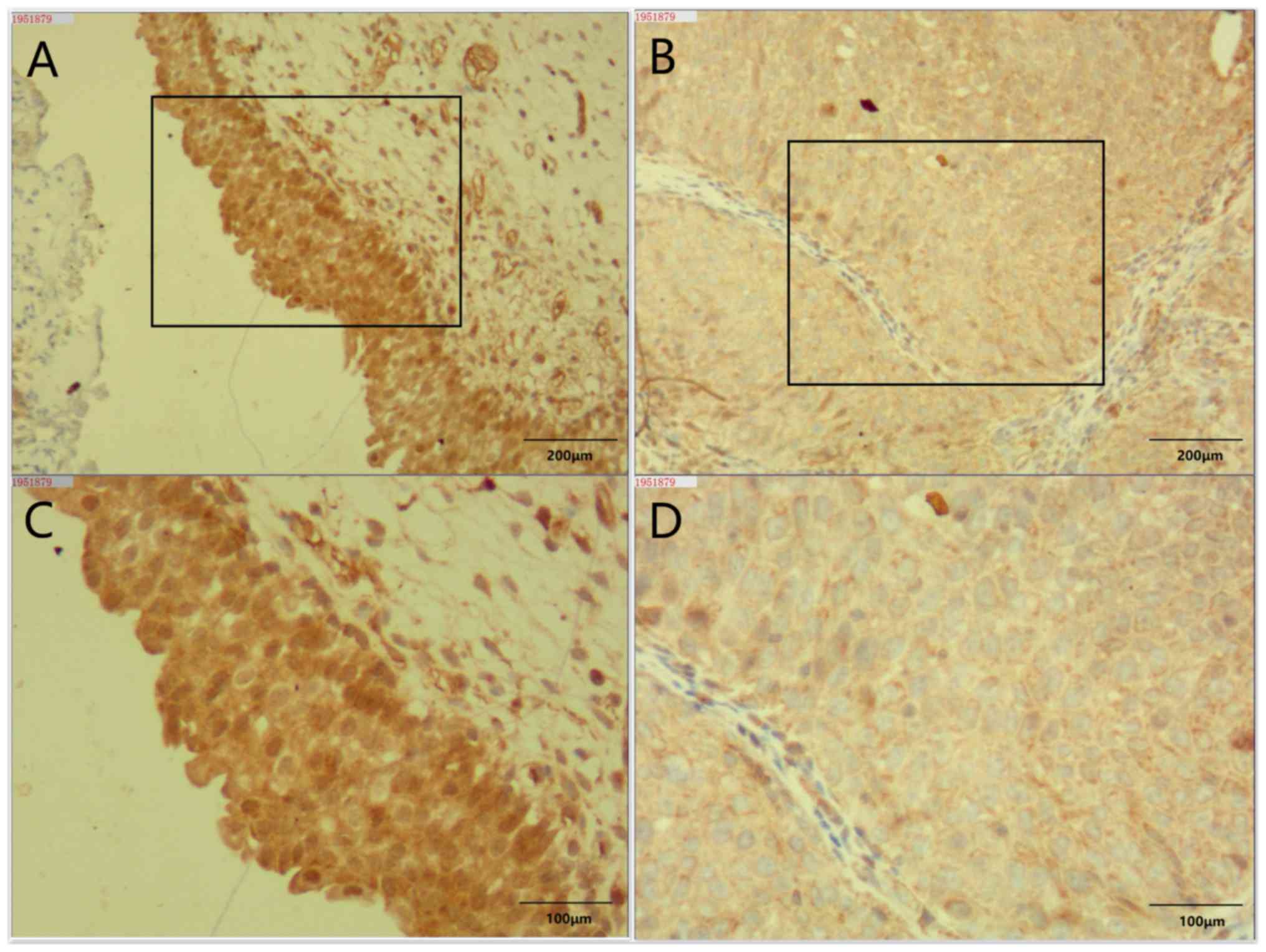|
1
|
Bray F, Ferlay J, Soerjomataram I, Siegel
RL, Torre LA and Jemal A: Global Cancer Statistics 2018: GLOBOCAN
estimates of incidence and mortality worldwide for 36 cancers in
185 countries. CA Cancer J Clin. 68:394–424. 2018. View Article : Google Scholar : PubMed/NCBI
|
|
2
|
Burger M, Catto JW, Dalbagni G, Grossman
HB, Herr H, Karakiewicz P, Kassouf W, Kiemeney LA, La Vecchia C,
Shariat S, et al: Epidemiology and risk factors of urothelial
bladder cancer. Eur Urol. 63:234–241. 2013. View Article : Google Scholar : PubMed/NCBI
|
|
3
|
Cumberbatch MGK, Jubber I, Black PC,
Esperto F, Figueroa JD, Kamat AM, Kiemeney L, Lotan Y, Pang K,
Silverman DT, et al: Epidemiology of bladder cancer: A systematic
review and contemporary update of risk factors in 2018. Eur Urol.
74:784–795. 2018. View Article : Google Scholar : PubMed/NCBI
|
|
4
|
Obara W, Eto M, Mimata H, Kohri K,
Mitsuhata N, Miura I, Shuin T, Miki T, Koie T, Fujimoto H, et al: A
phase I/II study of cancer peptide vaccine S-288310 in patients
with advanced urothelial carcinoma of the bladder. Ann Oncol.
28:798–803. 2017. View Article : Google Scholar : PubMed/NCBI
|
|
5
|
Lavoie JM, Bidnur S, Black PC and Eigl BJ:
Expanding immunotherapy options for bladder cancer: commentary on:
Pembrolizumab as second-line therapy for advanced urothelial
carcinoma. Urology. 106:1–2. 2017. View Article : Google Scholar : PubMed/NCBI
|
|
6
|
Hamilou Z, Lavaud P and Loriot Y:
Atezolizumab in urothelial bladder carcinoma. Future Oncol.
14:331–341. 2018. View Article : Google Scholar : PubMed/NCBI
|
|
7
|
Kamat AM, Bellmunt J, Galsky MD, Konety
BR, Lamm DL, Langham D, Lee CT, Milowsky MI, ODonnell MA, ODonnell
PH, et al: Society for Immunotherapy of Cancer consensus statement
on immunotherapy for the treatment of bladder carcinoma. J
Immunother Cancer. 5:682017. View Article : Google Scholar : PubMed/NCBI
|
|
8
|
Liu YN, Zhang H, Zhang L, Cai TT, Huang
DJ, He J, Ni HH, Zhou FJ, Zhang XS and Li J: Sphingosine 1
phosphate receptor-1 (S1P1) promotes tumor-associated regulatory T
cell expansion: Leading to poor survival in bladder cancer. Cell
Death Dis. 10:502019. View Article : Google Scholar : PubMed/NCBI
|
|
9
|
Mukherjee N, Ji N, Hurez V, Curiel TJ,
Montgomery MO, Braun AJ, Nicolas M, Aguilera M, Kaushik D, Liu Q,
et al: Intratumoral CD56bright natural killer cells are associated
with improved survival in bladder cancer. Oncotarget.
9:36492–36502. 2018. View Article : Google Scholar : PubMed/NCBI
|
|
10
|
Sjödahl G, Lövgren K, Lauss M, Chebil G,
Patschan O, Gudjonsson S, Månsson W, Fernö M, Leandersson K,
Lindgren D, et al: Infiltration of CD3+ and CD68+ cells in bladder
cancer is subtype specific and affects the outcome of patients with
muscle-invasive tumors. Urol Oncol. 32:791–797. 2014. View Article : Google Scholar : PubMed/NCBI
|
|
11
|
Wang B, Xie S, Bi J, Liu Z, Zeng H, Huang
H, Xue M, He Z, Yang M, Yu H, et al: Elevated pre-existing
lymphocytic infiltrates in tumour stroma predict poor prognosis in
resectable urothelial carcinoma of the bladder. Histopathology.
75:354–364. 2019. View Article : Google Scholar : PubMed/NCBI
|
|
12
|
Sun GG, Lu YF, Fu ZZ, Cheng YJ and Hu WN:
EMP1 inhibits nasopharyngeal cancer cell growth and metastasis
through induction apoptosis and angiogenesis. Tumour Biol.
35:3185–3193. 2014. View Article : Google Scholar : PubMed/NCBI
|
|
13
|
Sun G, Zhao G, Lu Y, Wang Y and Yang C:
Association of EMP1 with gastric carcinoma invasion, survival and
prognosis. Int J Oncol. 45:1091–1098. 2014. View Article : Google Scholar : PubMed/NCBI
|
|
14
|
Sun GG, Wang YD, Cui DW, Cheng YJ and Hu
WN: Epithelial membrane protein 1 negatively regulates cell growth
and metastasis in colorectal carcinoma. World J Gastroenterol.
20:4001–4010. 2014. View Article : Google Scholar : PubMed/NCBI
|
|
15
|
Sun GG, Wang YD, Lu YF and Hu WN: EMP1, a
member of a new family of antiproliferative genes in breast
carcinoma. Tumour Biol. 35:3347–3354. 2014. View Article : Google Scholar : PubMed/NCBI
|
|
16
|
Sun GG, Wang YD, Cui DW, Cheng YJ and Hu
WN: EMP1 regulates caspase-9 and VEGFC expression and suppresses
prostate cancer cell proliferation and invasion. Tumour Biol.
35:3455–3462. 2014. View Article : Google Scholar : PubMed/NCBI
|
|
17
|
Ariës IM, Jerchel IS, van den Dungen RE,
van den Berk LC, Boer JM, Horstmann MA, Escherich G, Pieters R and
den Boer ML: EMP1, a novel poor prognostic factor in pediatric
leukemia regulates prednisolone resistance, cell proliferation,
migration and adhesion. Leukemia. 28:1828–1837. 2014. View Article : Google Scholar : PubMed/NCBI
|
|
18
|
Jain A, Tindell CA, Laux I, Hunter JB,
Curran J, Galkin A, Afar DE, Aronson N, Shak S, Natale RB, et al:
Epithelial membrane protein-1 is a biomarker of gefitinib
resistance. Proc Natl Acad Sci USA. 102:11858–11863. 2005.
View Article : Google Scholar : PubMed/NCBI
|
|
19
|
Ben-Porath I and Benvenisty N:
Characterization of a tumor-associated gene, a member of a novel
family of genes encoding membrane glycoproteins. Gene. 183:69–75.
1996. View Article : Google Scholar : PubMed/NCBI
|
|
20
|
Li YQ, Xue T, Wang L, Xu ZC, Xi ZQ, Yuan
J, Wang XF, Chen YM, Zhang M and Yao L: Up-regulation of epithelial
membrane protein-1 in the temporal neocortex of patients with
intractable epilepsy. Neurochem Res. 34:1594–1602. 2009. View Article : Google Scholar : PubMed/NCBI
|
|
21
|
Ramnarain DB, Park S, Lee DY, Hatanpaa KJ,
Scoggin SO, Otu H, Libermann TA, Raisanen JM, Ashfaq R, Wong ET, et
al: Differential gene expression analysis reveals generation of an
autocrine loop by a mutant epidermal growth factor receptor in
glioma cells. Cancer Res. 66:867–874. 2006. View Article : Google Scholar : PubMed/NCBI
|
|
22
|
De Marco C, Laudanna C, Rinaldo N,
Oliveira DM, Ravo M, Weisz A, Ceccarelli M, Caira E, Rizzuto A,
Zoppoli P, et al: Specific gene expression signatures induced by
the multiple oncogenic alterations that occur within the
PTEN/PI3K/AKT pathway in lung cancer. PLoS One. 12:e01788652017.
View Article : Google Scholar : PubMed/NCBI
|
|
23
|
Wang YW, Li WM, Wu WJ, Chai CY, Chang TY,
Sun Y, Cheng CJ, Shiue YL, Su SJ, Cheng HL, et al: Epithelial
membrane protein 2 is a prognostic indictor for patients with
urothelial carcinoma of the upper urinary tract. Am J Pathol.
183:709–719. 2013. View Article : Google Scholar : PubMed/NCBI
|
|
24
|
Humphrey PA, Moch H, Cubilla AL, Ulbright
TM and Reuter VE: The 2016 WHO Classification of Tumours of the
Urinary System and Male Genital Organs-Part B: Prostate and bladder
tumours. Eur Urol. 70:106–119. 2016. View Article : Google Scholar : PubMed/NCBI
|
|
25
|
Demirag GG, Kefeli M, Kemal Y and Yucel I:
Epithelial membrane protein 1 expression in ovarian serous tumors.
Oncol Lett. 11:2140–2144. 2016. View Article : Google Scholar : PubMed/NCBI
|
|
26
|
Li B and Dewey CN: RSEM: Accurate
transcript quantification from RNA-Seq data with or without a
reference genome. BMC Bioinformatics. 12:3232011. View Article : Google Scholar : PubMed/NCBI
|
|
27
|
Team R: Core. A language and environment
for statistical computing. R Foundation for Statistical Computing.
2014.
|
|
28
|
Yoshihara K, Shahmoradgoli M, Martínez E,
Vegesna R, Kim H, Torres-Garcia W, Treviño V, Shen H, Laird PW,
Levine DA, et al: Inferring tumour purity and stromal and immune
cell admixture from expression data. Nat Commun. 4:26122013.
View Article : Google Scholar : PubMed/NCBI
|
|
29
|
Nagy Á, Lánczky A, Menyhárt O and Győrffy
B: Validation of miRNA prognostic power in hepatocellular carcinoma
using expression data of independent datasets. Sci Rep. 8:92272018.
View Article : Google Scholar : PubMed/NCBI
|
|
30
|
Ru B, Wong CN, Tong Y, Zhong JY, Zhong
SSW, Wu WC, Chu KC, Wong CY, Lau CY, Chen I, et al: TISIDB: An
integrated repository portal for tumor-immune system interactions.
Bioinformatics. 35:4200–4202. 2019. View Article : Google Scholar : PubMed/NCBI
|
|
31
|
Gao J, Aksoy BA, Dogrusoz U, Dresdner G,
Gross B, Sumer SO, Sun Y, Jacobsen A, Sinha R, Larsson E, et al:
Integrative analysis of complex cancer genomics and clinical
profiles using the cBioPortal. Sci Signal. 6:pl12013. View Article : Google Scholar : PubMed/NCBI
|
|
32
|
Cerami E, Gao J, Dogrusoz U, Gross BE,
Sumer SO, Aksoy BA, Jacobsen A, Byrne CJ, Heuer ML, Larsson E, et
al: The cBio cancer genomics portal: An open platform for exploring
multidimensional cancer genomics data. Cancer Discov. 2:401–404.
2012. View Article : Google Scholar : PubMed/NCBI
|
|
33
|
Peter S, Borkowska E, Drayton RM, Rakhit
CP, Noon A, Chen W and Catoo JW: Identification of differentially
expressed long noncoding RNAs in bladder cancer. Clin Cancer Res.
20:5311–21. 2014. View Article : Google Scholar : PubMed/NCBI
|
|
34
|
Ben-Porath I, Kozak CA and Benvenisty N:
Chromosomal mapping of Tmp (Emp1), Xmp (Emp2), and Ymp (Emp3),
genes encoding membrane proteins related to Pmp22. Genomics.
49:443–447. 1998. View Article : Google Scholar : PubMed/NCBI
|
|
35
|
Chen Y, Medvedev A, Ruzanov P, Marvin KW
and Jetten AM: cDNA cloning, genomic structure, and chromosome
mapping of the human epithelial membrane protein CL-20 gene (EMP1),
a member of the PMP22 family. Genomics. 41:40–48. 1997. View Article : Google Scholar : PubMed/NCBI
|
|
36
|
Ahmat Amin MKB, Shimizu A and Ogita H: The
pivotal roles of the epithelial membrane protein family in cancer
invasiveness and metastasis. Cancers (Basel). 11:112019. View Article : Google Scholar
|
|
37
|
Da Y and Jia J: Study of antibodies to
PMP22, IL-6 and TNF-alpha concentrations in serum in a CMTX1
family. Neurosci Lett. 424:73–77. 2007. View Article : Google Scholar : PubMed/NCBI
|
|
38
|
Gabriel CM, Gregson NA and Hughes RA:
Anti-PMP22 antibodies in patients with inflammatory neuropathy. J
Neuroimmunol. 104:139–146. 2000. View Article : Google Scholar : PubMed/NCBI
|
|
39
|
Kornberg LJ, Villaret D, Popp M, Lui L,
McLaren R, Brown H, Cohen D, Yun J and McFadden M: Gene expression
profiling in squamous cell carcinoma of the oral cavity shows
abnormalities in several signaling pathways. Laryngoscope.
115:690–698. 2005. View Article : Google Scholar : PubMed/NCBI
|
|
40
|
Kuriakose MA, Chen WT, He ZM, Sikora AG,
Zhang P, Zhang ZY, Qiu WL, Hsu DF, McMunn-Coffran C, Brown SM, et
al: Selection and validation of differentially expressed genes in
head and neck cancer. Cell Mol Life Sci. 61:1372–1383. 2004.
View Article : Google Scholar : PubMed/NCBI
|
|
41
|
Hippo Y, Yashiro M, Ishii M, Taniguchi H,
Tsutsumi S, Hirakawa K, Kodama T and Aburatani H: Differential gene
expression profiles of scirrhous gastric cancer cells with high
metastatic potential to peritoneum or lymph nodes. Cancer Res.
61:889–895. 2001.PubMed/NCBI
|
|
42
|
Wei Q, Li M, Fu X, Tang R, Na Y, Jiang M
and Li Y: Global analysis of differentially expressed genes in
androgen-independent prostate cancer. Prostate Cancer Prostatic
Dis. 10:167–174. 2007. View Article : Google Scholar : PubMed/NCBI
|
|
43
|
Arslan AA, Gold LI, Mittal K, Suen TC,
Belitskaya-Levy I, Tang MS and Toniolo P: Gene expression studies
provide clues to the pathogenesis of uterine leiomyoma: New
evidence and a systematic review. Hum Reprod. 20:852–863. 2005.
View Article : Google Scholar : PubMed/NCBI
|
|
44
|
Zhang J, Cao W, Xu Q and Chen WT: The
expression of EMP1 is downregulated in oral squamous cell carcinoma
and possibly associated with tumour metastasis. J Clin Pathol.
64:25–29. 2011. View Article : Google Scholar : PubMed/NCBI
|
|
45
|
Lai S, Wang G, Cao X, Li Z, Hu J and Wang
J: EMP-1 promotes tumorigenesis of NSCLC through PI3K/AKT pathway.
J Huazhong Univ Sci Technolog Med Sci. 32:834–838. 2012. View Article : Google Scholar : PubMed/NCBI
|
|
46
|
Zhang Ht: Lu YcandHe J. Expression of
epithelial membrane protein 1 in human gliomas and its clinical
implications. Zhongguo Zhongliu Shengwu Zhiliao Zazhi. 14:466–470.
2007.
|
|
47
|
Turashvili G, Bouchal J, Baumforth K, Wei
W, Dziechciarkova M, Ehrmann J, Klein J, Fridman E, Skarda J,
Srovnal J, et al: Novel markers for differentiation of lobular and
ductal invasive breast carcinomas by laser microdissection and
microarray analysis. BMC Cancer. 7:552007. View Article : Google Scholar : PubMed/NCBI
|
|
48
|
Mackay A, Jones C, Dexter T, Silva RL,
Bulmer K, Jones A, Simpson P, Harris RA, Jat PS, Neville AM, et al:
cDNA microarray analysis of genes associated with ERBB2 (HER2/neu)
overexpression in human mammary luminal epithelial cells. Oncogene.
22:2680–2688. 2003. View Article : Google Scholar : PubMed/NCBI
|
|
49
|
Lobsiger CS, Magyar JP, Taylor V, Wulf P,
Welcher AA, Program AE and Suter U: Identification and
characterization of a cDNA and the structural gene encoding the
mouse epithelial membrane protein-1. Genomics. 36:379–387. 1996.
View Article : Google Scholar : PubMed/NCBI
|
|
50
|
Wang HT, Kong JP, Ding F, Wang XQ, Wang
MR, Liu LX, Wu M and Liu ZH: Analysis of gene expression profile
induced by EMP-1 in esophageal cancer cells using cDNA Microarray.
World J Gastroenterol. 9:392–398. 2003. View Article : Google Scholar : PubMed/NCBI
|
|
51
|
Ruegg CL, Wu HY, Fagnoni FF, Engleman EG
and Laus R: B4B, a novel growth-arrest gene, is expressed by a
subset of progenitor/pre-B lymphocytes negative for cytoplasmic
mu-chain. J Immunol. 157:72–80. 1996.PubMed/NCBI
|
|
52
|
Wang YW, Cheng HL, Ding YR, Chou LH and
Chow NH: EMP1, EMP 2, and EMP3 as novel therapeutic targets in
human cancer. Biochim Biophys Acta Rev Cancer. 1868:199–211. 2017.
View Article : Google Scholar : PubMed/NCBI
|
|
53
|
Durgan J, Tao G, Walters MS, Florey O,
Schmidt A, Arbelaez V, Rosen N, Crystal RG and Hall A: SOS1 and Ras
regulate epithelial tight junction formation in the human airway
through EMP1. EMBO Rep. 16:87–96. 2015. View Article : Google Scholar : PubMed/NCBI
|
|
54
|
Morales SA, Telander DG, Mareninov S, Nagy
A, Wadehra M, Braun J and Gordon LK: Anti-EMP2 diabody blocks
epithelial membrane protein 2 (EMP2) and FAK mediated collagen gel
contraction in ARPE-19 cells. Exp Eye Res. 102:10–16. 2012.
View Article : Google Scholar : PubMed/NCBI
|
|
55
|
Wadehra M, Forbes A, Pushkarna N,
Goodglick L, Gordon LK, Williams CJ and Braun J: Epithelial
membrane protein-2 regulates surface expression of alphavbeta3
integrin in the endometrium. Dev Biol. 287:336–345. 2005.
View Article : Google Scholar : PubMed/NCBI
|
|
56
|
Morales SA, Mareninov S, Wadehra M, Zhang
L, Goodglick L, Braun J and Gordon LK: FAK activation and the role
of epithelial membrane protein 2 (EMP2) in collagen gel
contraction. Invest Ophthalmol Vis Sci. 50:462–469. 2009.
View Article : Google Scholar : PubMed/NCBI
|
|
57
|
Wadehra M, Goodglick L and Braun J: The
tetraspan protein EMP2 modulates the surface expression of
caveolins and glycosylphosphatidyl inositol-linked proteins. Mol
Biol Cell. 15:2073–2083. 2004. View Article : Google Scholar : PubMed/NCBI
|
|
58
|
Ayari C, LaRue H, Hovington H, Caron A,
Bergeron A, Têtu B, Fradet V and Fradet Y: High level of mature
tumor-infiltrating dendritic cells predicts progression to muscle
invasion in bladder cancer. Hum Pathol. 44:1630–1637. 2013.
View Article : Google Scholar : PubMed/NCBI
|
|
59
|
Pichler R, Fritz J, Zavadil C, Schäfer G,
Culig Z and Brunner A: Tumor-infiltrating immune cell
subpopulations influence the oncologic outcome after intravesical
Bacillus Calmette-Guérin therapy in bladder cancer. Oncotarget.
7:39916–39930. 2016. View Article : Google Scholar : PubMed/NCBI
|
|
60
|
Kawahara T, Furuya K, Nakamura M, Sakamaki
K, Osaka K, Ito H, Ito Y, Izumi K, Ohtake S, Miyoshi Y, et al:
Neutrophil-to-lymphocyte ratio is a prognostic marker in bladder
cancer patients after radical cystectomy. BMC Cancer. 16:1852016.
View Article : Google Scholar : PubMed/NCBI
|
|
61
|
Peng D, Gong YQ, Hao H, He ZS, Li XS,
Zhang CJ and Zhou LQ: Preoperative prognostic nutritional index is
a significant predictor of survival with bladder cancer after
radical cystectomy: A retrospective study. BMC Cancer. 17:3912017.
View Article : Google Scholar : PubMed/NCBI
|
|
62
|
Hamilton-Reeves JM, Bechtel MD, Hand LK,
Schleper A, Yankee TM, Chalise P, Lee EK, Mirza M, Wyre H, Griffin
J, et al: Effects of immunonutrition for cystectomy on immune
response and infection rates: A pilot randomized controlled
clinical trial. Eur Urol. 69:389–392. 2016. View Article : Google Scholar : PubMed/NCBI
|
|
63
|
Demirer Z and Uslu AU: Predictive value of
neutrophil-lymphocyte ratio in non-muscle-invasive bladder cancer.
Urol Oncol. 34:1–2. 2016. View Article : Google Scholar : PubMed/NCBI
|
|
64
|
Zhou L, Xu L, Chen L, Fu Q, Liu Z, Chang
Y, Lin Z and Xu J: Tumor-infiltrating neutrophils predict benefit
from adjuvant chemotherapy in patients with muscle invasive bladder
cancer. OncoImmunology. 6:e12932112017. View Article : Google Scholar : PubMed/NCBI
|
|
65
|
Zhang Q, Hao C, Cheng G, Wang L, Wang X,
Li C, Qiu J and Ding K: High CD4+ T cell density is associated with
poor prognosis in patients with non-muscle-invasive bladder cancer.
Int J Clin Exp Pathol. 8:11510–11516. 2015.PubMed/NCBI
|
|
66
|
Pfannstiel C, Strissel PL, Chiappinelli
KB, Sikic D, Wach S, Wirtz RM, Wullweber A, Taubert H, Breyer J,
Otto W, et al BRIDGE Consortium Germany; BRIDGE Consortium Germany;
BRIDGE Consortium Germany; BRIDGE Consortium Germany, : The Tumor
Immune Microenvironment Drives a Prognostic Relevance That
Correlates with Bladder Cancer Subtypes. Cancer Immunol Res.
7:923–938. 2019. View Article : Google Scholar : PubMed/NCBI
|
|
67
|
Wu K, Tan MY, Jiang JT, Mu XY, Wang JR,
Zhou WJ, Wang X, Li MQ, He YY and Liu ZH: Cisplatin inhibits the
progression of bladder cancer by selectively depleting G-MDSCs: A
novel chemoimmunomodulating strategy. Clin Immunol. 193:60–69.
2018. View Article : Google Scholar : PubMed/NCBI
|
|
68
|
Smith SG, Baltz JL, Koppolu BP,
Ravindranathan S, Nguyen K and Zaharoff DA: Immunological
mechanisms of intravesical chitosan/interleukin-12 immunotherapy
against murine bladder cancer. OncoImmunology. 6:e12590502016.
View Article : Google Scholar : PubMed/NCBI
|
|
69
|
Horn T, Laus J, Seitz AK, Maurer T, Schmid
SC, Wolf P, Haller B, Winkler M, Retz M, Nawroth R, et al: The
prognostic effect of tumour-infiltrating lymphocytic subpopulations
in bladder cancer. World J Urol. 34:181–187. 2016. View Article : Google Scholar : PubMed/NCBI
|
|
70
|
Winerdal ME, Krantz D, Hartana CA,
Zirakzadeh AA, Linton L, Bergman EA, Rosenblatt R, Vasko J,
Alamdari F, Hansson J, et al: Urinary bladder cancer tregs suppress
MMP2 and potentially regulate invasiveness. Cancer Immunol Res.
6:528–538. 2018. View Article : Google Scholar : PubMed/NCBI
|
|
71
|
Wang Q, Chang W, Yang X, Cheng Y, Zhao X,
Zhou L, Li J, Li J and Zhang K: Levels of miR-31 and its target
genes in dermal mesenchymal cells of patients with psoriasis. Int J
Dermatol. 58:198–204. 2019. View Article : Google Scholar : PubMed/NCBI
|
|
72
|
Pan L, Yang H, Tang W, Xu C, Chen S, Meng
Z, Li K and Chen H: Pathway-focused PCR array profiling of CAL-27
cell with over-expressed ZNF750. Oncotarget. 9:566–575. 2017.
View Article : Google Scholar : PubMed/NCBI
|
|
73
|
Wang Y, Chaudhri G, Jackson RJ and
Karupiah G: IL-12p40 and IL-18 play pivotal roles in orchestrating
the cell-mediated immune response to a poxvirus infection. J
Immunol. 183:3324–3331. 2009. View Article : Google Scholar : PubMed/NCBI
|
|
74
|
Kehrmann J, Effenberg L, Wilk C, Schoemer
D, Ngo Thi Phuong N, Adamczyk A, Pastille E, Scholtysik R,
Klein-Hitpass L, Klopfleisch R, et al: Depletion of Foxp3+
regulatory T cells is accompanied by an increase in the relative
abundance of Firmicutes in the murine gut microbiome. Immunology.
159:344–353. 2020. View Article : Google Scholar : PubMed/NCBI
|
|
75
|
Sperk M, Domselaar RV and Neogi U: Immune
checkpoints as the immune system regulators and potential
biomarkers in HIV-1 infection. Int J Mol Sci. 19:192018. View Article : Google Scholar
|
|
76
|
Chan AW, Zhang Z, Chong CC, Tin EK, Chow C
and Wong N: Genomic landscape of lymphoepithelioma-like
hepatocellular carcinoma. J Pathol. 249:166–172. 2019. View Article : Google Scholar : PubMed/NCBI
|
|
77
|
Yoshikawa T, Nakatsugawa M, Suzuki S,
Shirakawa H, Nobuoka D, Sakemura N, Motomura Y, Tanaka Y, Hayashi S
and Nakatsura T: HLA-A2-restricted glypican-3 peptide-specific CTL
clones induced by peptide vaccine show high avidity and
antigen-specific killing activity against tumor cells. Cancer Sci.
102:918–925. 2011. View Article : Google Scholar : PubMed/NCBI
|
|
78
|
Germeau C, Ma W, Schiavetti F, Lurquin C,
Henry E, Vigneron N, Brasseur F, Lethé B, De Plaen E, Velu T, et
al: High frequency of antitumor T cells in the blood of melanoma
patients before and after vaccination with tumor antigens. J Exp
Med. 201:241–248. 2005. View Article : Google Scholar : PubMed/NCBI
|
|
79
|
Takashima Y, Kawaguchi A, Sato R, Yoshida
K, Hayano A, Homma J, Fukai J, Iwadate Y, Kajiwara K, Ishizawa S,
et al: Differential expression of individual transcript variants of
PD-1 and PD-L2 genes on Th-1/Th-2 status is guaranteed for
prognosis prediction in PCNSL. Sci Rep. 9:100042019. View Article : Google Scholar : PubMed/NCBI
|
|
80
|
Zhou G, Sprengers D, Boor PPC, Doukas M,
Schutz H, Mancham S, Pedroza-Gonzalez A, Polak WG, de Jonge J,
Gaspersz M, et al: Antibodies against immune checkpoint molecules
restore functions of tumor-infiltrating T cells in hepatocellular
carcinomas. Gastroenterology. 153:1107–1119e10. 2017. View Article : Google Scholar : PubMed/NCBI
|
|
81
|
Kim JY, Lee E, Park K, Park WY, Jung HH,
Ahn JS, Im YH and Park YH: Immune signature of metastatic breast
cancer: Identifying predictive markers of immunotherapy response.
Oncotarget. 8:47400–47411. 2017. View Article : Google Scholar : PubMed/NCBI
|
|
82
|
Flecken T, Schmidt N, Hild S, Gostick E,
Drognitz O, Zeiser R, Schemmer P, Bruns H, Eiermann T, Price DA, et
al: Immunodominance and functional alterations of tumor-associated
antigen-specific CD8+ T-cell responses in hepatocellular carcinoma.
Hepatology. 59:1415–1426. 2014. View Article : Google Scholar : PubMed/NCBI
|















